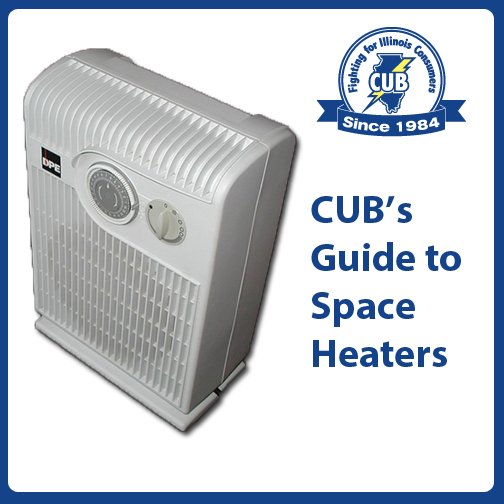As temperatures drop this winter, many of us are digging out the space heater from the crawl space–anything to stay warm, right?
But before you plug in, you probably have some questions. Are space heaters cost-effective for home heating? Do they pose a safety risk? What type of heater is best for my home?
We’ve got you covered in CUB’s Guide to Space Heaters. Read below for all the latest information on keeping warm, safe, and under-budget this winter.
Cost-effectiveness
Heating accounts for 42 percent of people’s home energy needs, according to the U.S. Department of Energy, making it the largest portion of your utility bills. So space heaters seem like an efficient way to keep warm without cranking the thermostat, right?
Not necessarily. While an electric space heater may seem economical, it could actually increase your bills. After all, electricity tends to be more expensive than natural gas. (Consumer Reports even says outright, “Don’t expect savings” in its Space Heater Buying Guide.)
The U.S. Department of Energy says that, “In some cases, small space heaters can be less expensive to use if you only want to heat one room or supplement inadequate heating in one room.”
So think of space heaters more as a supplement to your normal heating needs, or a way to increase your comfort on particularly cold days. If you plan on breaking even, though, turn down the thermostat in other rooms when using a portable heater in the room you are occupying.
If you’re truly worried about your winter budget, think about energy efficiency–how you can keep the warm air in and the cold air out–rather than space heating. Add insulation to attics, basements, crawl spaces. Seal the cracks around doors and windows. Use a programmable thermostat to avoid overheating rooms not in use. (Visit www.CUBEnergySaver.com for more helpful tips!)
Safety
Space heaters can pose significant safety risks. According to the U.S. Consumer Product Safety Commission, space heaters are responsible for 25,000 fires and 300 deaths annually.
Space heaters come in both electric and fuel-burning types. Consumer Reports advises against purchasing a fuel-burning heater (except for use in outdoor spaces) because of the risk of carbon monoxide poisoning due to the open flame and the general risks of handling fuel.
Electric space heaters, however, still pose serious safety risks. Follow these tips to prevent any emergencies:
- Don’t leave a space heater unattended while it’s plugged in, and keep children and pets away.
- Don’t use a heater in damp or wet areas unless it’s designed for outdoors or bathrooms.
- Place the heater on a flat, level surface so that it does not tip-over. Many new heaters also have a tip-over safety switch, so that the heater automatically turns off if it tips over.
- Never leave a space heater plugged in overnight.
- Make sure your smoke detector is up to date.
- Plug electric heaters directly into the wall unit. If an extension cord is necessary, use the shortest possible heavy-duty cord.
- Check cords regularly for damage. Damage to overextended cords is a leading cause of space heater-related fires.
- Keep combustible materials such as furniture, bedding, and curtains at least three feet from the heater. Don’t use a heater near paint, gas cans, or matches.
- Consider buying a newer heater. Many old heaters do not meet current safety standards, and new versions generally have the most updated safety features.
Tips for Purchasing
To save money and stay safe, consider the following tips when purchasing a space heater:
- Figure out the type of heat you need. Electric space heaters either use convection or radiant heat. Convection models circulate heated air to create warmth. They are good for heating large rooms or serving multiple people. Radiant heaters simply radiate the heat they produce. They are best for “spot-heating” or quickly warming small spaces.
- Match the size of your heater to the space you are trying to heat. Don’t buy oversized heaters. Most heaters come with a general sizing guide to help you make the decision.
- If you can, purchase a heater with a thermostat to avoid unnecessary overheating.
- Consider the latest safety features to protect you and your family.
Any other tips? Leave them in the comments!


